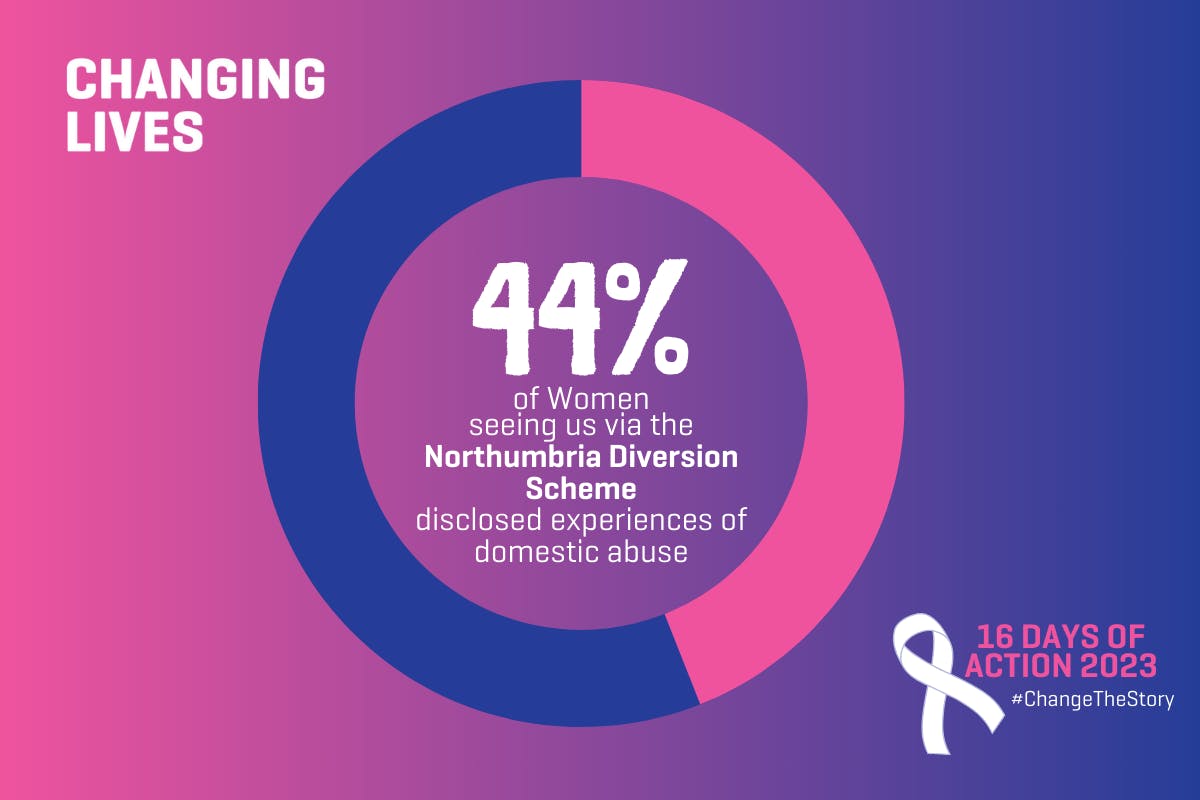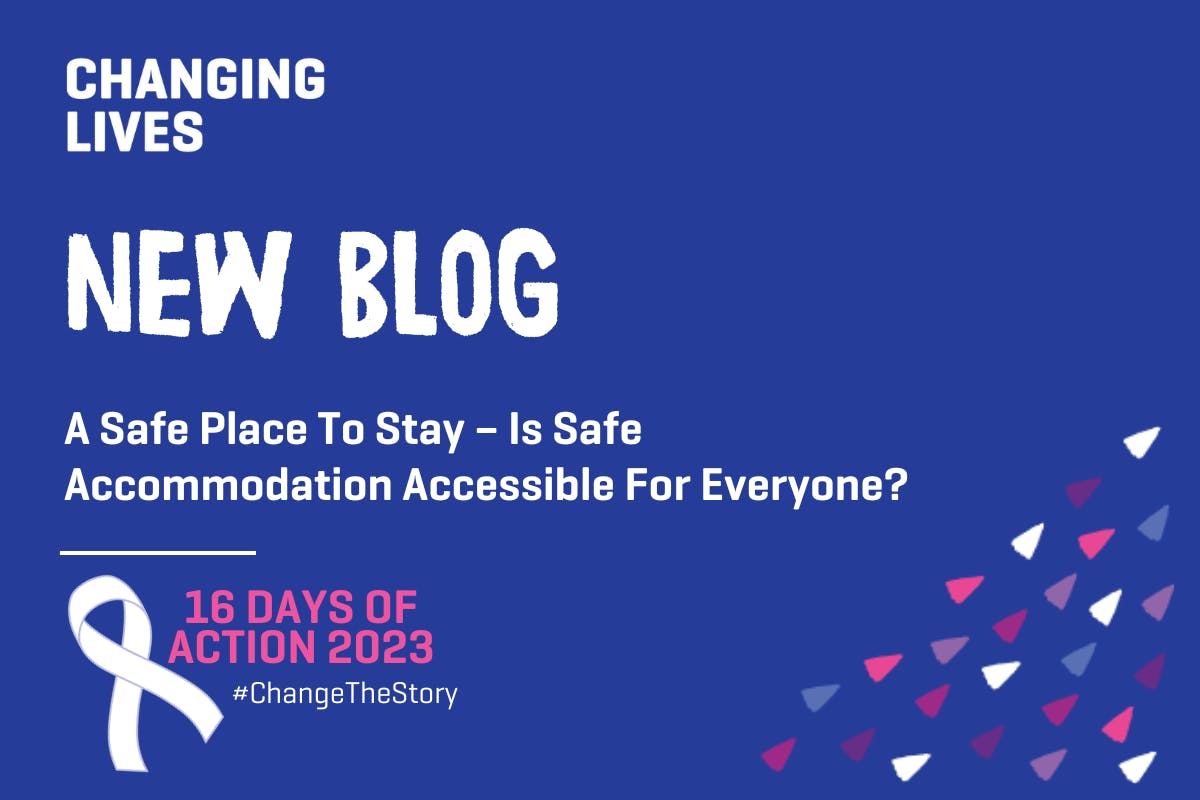On day 4 of the 16 Days of Action Against Gender-Based Violence, Criminal Justice Area Manager Lisa Boyack discusses the importance of diversion schemes to prevent women from circumstances that mean re-offending is likely.
Our national women’s and children’s services challenge assumptions that some women are seen as ‘hard to reach’ or have been described as ‘complex’ - we want to #ChangeTheStory so women are better understood and supported. We will do this by sharing our practice and research on supporting women experiencing multiple layers of disadvantage, violence, and abuse.
Why are diversion from court services so important for women?
Diversion schemes are vital for women. They are important for men too, in intervening early, or after periods of desistance, in diverting away from the justice system before negative coping strategies or behaviours become too entrenched.
But for women, the justice system is different for them compared to men. Women account for 51% of the population of England and Wales, but only 15% of all arrests made are women, and they account for just 4% of the prison population. Here’s where the disparity becomes apparent:
- Women appear before the courts for less severe offences than men, yet women are more likely to end up in prison for their first offence (PRT 2021);
- Because they commit less serious offences than men, women in prison are more likely to be serving short sentences;
- In 2021, TV licence evasion was the offence with the highest proportion of female defendants - 75% of all prosecutions for TV licence evasion were female.
- Of all female offenders cautioned/convicted in 2021, 35% were first time offenders (22% for males).
The reasons women enter the Justice system are far different to men, and we know that past and current trauma is often what underpins their offending. This can include coercion, exploitation, negative coping strategies or risky behaviours. The Howard League (n.d.) estimates nearly two thirds of women in the criminal justice system have experienced domestic abuse. Many have experienced childhood trauma, mental health problems or homelessness.
Changing Lives have been providing Out of Court Disposal interventions since 2017, and currently cover Northumbria, Nottingham and West Midlands. Over the past two years in Northumbria alone we have supported almost 400 women made subject to a Conditional Caution – women who would have gone through the Court system without this intervention.
44% of women seeing us via the Northumbria diversion scheme disclosed experiences of domestic abuse. We know the actual figure will be much higher, but many are too scared to vocalise their trauma - imagine disclosing this to someone you’ve never met before, someone you have no reason to trust but you’re complying with because you’re fearful of the alternative? I know from my own childhood experiences of trauma, it’s something I hid because I had to; the one time I tried to tell someone about it my siblings panic and denial meant at a very young age I realised it was meant to be a secret, and so it remained that way until many years after Mam had the courage to flee with us.
I’m a firm believer that any woman who commits an offence has experienced some kind of crisis, whether this is their first or fiftieth office - for some it will be through desperation, they may have exhausted all alternatives, for others it could be a situational reaction. Many women involved in the Justice system are marginalised from services that others may take for granted. Often they don’t know what support is available to them in their local community, don’t realise the service is available to them, or don’t feel some places are intended for them and it is only when the crisis occurs and they find themselves in prison or under probation supervision that they are introduced to support networks. By this time, needs can have increased, trauma deepened, shame intensified.
We know that financial difficulties can be related to domestic abuse, and as the cost of living crisis continues to tighten its grip, now more than ever are diversion schemes needed. Mothers struggling to make ends meet are turning to shoplifting Calpol and formula milk – a diversion intervention would be more appropriate than going through the courts, where they can be assisted to review their finances, explore their benefit entitlement, apply for grants etc, and fix the situation instead of compounding it. By providing early intervention, we’re able to show women exactly what is available to them, we make introductions to their local services, support them to overcome barriers. We provide them with alternatives, so that when problems arise in the future, they know where they can turn.
At a time of such austerity, and more people coming under the supervision of the Probation Service to ease the prison crisis, diversion schemes are a much cheaper alternative, are trauma informed and supports women with their desistance and needs to be available across every police force. Unfortunately there is currently a postcode lottery in terms of access to these schemes, with the funding of many existing schemes under threat. It is not justice if a woman in one area can receive vital support to help them move on from offending, while a woman committing the same crime in another area ends up in the courts and eventually even prison because they were not given support early enough.
I’ll end with the voices of women we have supported, as their experiences are far better articulated by them than anything I can say:
“I feel anxious, I didn’t realise it (DV) was still affecting me because it’s been over a year. I definitely want to try and get some help, I didn’t think there was anyone out there who could help me now”
“I don’t have anyone to help me, I feel so alone. It’s nice to know there are places that will help me out”
"Thank you so much. I feel like I’ve got my daughter back. You encouraged her to come here (Oaktrees) and now we have our lives back”
“Can we still stay in touch? This is the first time I’ve ever engaged with someone. When I went through everything [DV and children being removed] I refused help and tried to get through it alone, now I’m ready to accept help”
#ChangeTheStory
References
- The Howard League (n.d). Women in the Penal System. Retrieved from The Howard League | Women in the Penal System
- Prison Reform Trust (2021), Women in Prison. Retrieved from Women in prison | Prison Reform Trust
- Ministry of Justice (2022), Statistics on Women and the Criminal Justice System 2021. Retrieved from statistics-on-women-and-the-criminal-justice-system-2021-.pdf (publishing.service.gov.uk)
If any of the issues we’ve raised affect you or someone you know and you need support, you can get in touch with us on central.office@changing-lives.org.uk or call us on 01912738891. You can find out more about the type of support we offer here.





